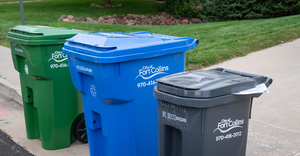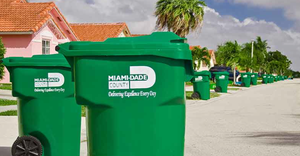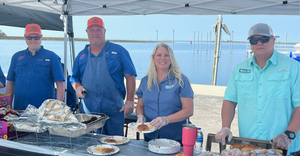From Life Cycle Assessments to Lifelong Learning: Q&A with SCS Engineers’ Ketan Shah
In this Q&A interview, Ketan Shah, a Waste360 40 Under 40 award winner, discusses how he supports his clients by creating project plans and designs that address their unique needs, and how he continues to learn new skills, while mentoring others.

Dr. Ketan Shah, Project Professional at SCS Engineers, works with clients throughout the Pacific Northwest to design solid waste management systems, and do life cycle assessments, environmental systems modeling, and optimization. He earned his doctorate from The University of Texas at Arlington.
In this Q&A interview, Shah, a Waste360 40 Under 40 award winner, discusses how he supports his clients by creating project plans and designs that address their unique needs, and how he continues to learn new skills, while mentoring others.
This interview has been edited for length.
Waste360: What are some of your major roles and responsibilities?
Ketan Shah: I have more than 12 years of experience, and I provide engineering support services for landfill design, permitting, construction management, and reporting for solid waste facilities.
Waste360: Can you talk a little bit about what life cycle assessment looks like? What are you looking for?
Ketan Shah: Life cycle assessment basically is a cradle-to-grave approach. You can also take a gate-to-gate, gate-to-grave, and a gate-to-cradle approach. When you start with a life cycle assessment, initially you look at the scope of work, your objectives, your system boundaries, and what you want to actually achieve.
If you are doing, for example, a cradle-to-grave approach, you'll consider the raw material extraction, the mining, and the level of emissions emitted from the mining, the transportation of that material to the manufacturing facility, and from the manufacturing facility to the wholesaler,
then to the retailer, and the amount of electrification being used during this supply chain.
At each step, you will determine how much emissions is being generated. It goes to the customer, and then finally to the consumer, and then it ends up in the landfill or it gets recycled, or it gets put into incineration, pyrolysis, gasification or a hybrid technology.
All these steps are considered the life cycle assessment, particularly from an environmental perspective. I do life cycle assessment modeling using different software tools. We also consider different databases for the emissions inventory and the emissions factors included for each and every type of product for which we do life cycle assessment modeling.
Waste360: What do you enjoy about the work that you do?
Ketan Shah: I would say no day is the same for me at SCS Engineers. I enjoy most doing life cycle gas recovery modeling for the landfills because I consider that to be at the heart of the landfill assessment. We have to understand whether this particular landfill will be having vertical gas wells or the horizontal collectors, how many will be there, and how densely they are being located on the landfill to extract as much gas as possible.
We work with private clients and public clients. I love interacting with our clients and our subcontractors. As a project manager, I need to understand the client’s concerns and make sure the client’s concerns are being satisfied.
I also like going into the field, doing visits, and not just sitting in the office. I like balancing both, going in the field to see what design I have created and how it is being implemented in the field.
Waste360: You have a PhD in your field, how has that helped you to succeed in your role as a Project Professional?
Ketan Shah: Based on my PhD research work, I'm doing a sub-subset of that research work at my employment. I would say the process of earning a PhD helps me to tackle all the challenging situations I face in my position. Second, a PhD helps you to make sure you have developed the skillset that helps you to easily and quickly learn new models and new skills.
Thinking big, is the third thing. That is the main, most important thing. You learn how to see the big picture, and to see from the client side of things, from the client’s perspective, and to understand exactly what the client wants. You understand how much they are willing to spend on this and in what respect. Sometimes there are some hidden messages you understand. You ask the right questions to the right people at the right time. That is how a PhD gives you leverage.
Waste360: What are some ways that you continue to add to your knowledge base?
Ketan Shah: We have the Landfill University in the SCS platform, where we have an opportunity to learn a lot of technical info from experienced experts at SCS Engineers. I do regularly attend those webinars and sessions.
I also attend a lot of other organization’s sessions like the SWANA sessions. I'm a chair for Source and Resource Conservation in the Air and Waste Management Association. I'm also part of the American Center for Life Cycle Assessment. I read the Waste360 magazine and Waste360 regular news. I do my own research work in the field in which I have done my PhD, so that keeps me updated with what the market is doing. I also have an interest in the mergers and acquisitions in the waste industry. I like to go in the field to talk to people so I can understand what their concerns are and how to optimize stuff so that the best project management skillset can be materialized.
Waste360: What is some advice you might give to a young professional starting their career in this industry?
Ketan Shah: I would say focus on what interests you and read [industry news], and connect with the people who have done something in the field. That will give you a clear roadmap. Without a roadmap, without understanding what others have done to achieve those goals, you can't achieve what you want to do. It is not a one-man show. It's all together. You’re part of a team. Team means “together everyone achieves more.”
I'm a mentor to University of Texas at Arlington students. I have five master’s students and three PhD students. I do mentor a few employees at SCS Engineers, those who have just started their careers. The [mentoring is more focused on] professional development than technical development.
You also need to be professionally growing by attending conferences. You need to be a part of an organization, to network with people, to develop your skillset, and to understand how different organizations work.
Waste360: Is there anything I didn't ask you that you would like to mention?
Ketan Shah: I'm always open to guide any student, any employee, not just from my firm. I consider myself as a part of the waste industry and as an environmental steward. I consider myself a citizen of the world rather than citizen of any of one country. That is the big picture. That is the main thing. If someone says, "What is your purpose?" My purpose is to organize the waste industry, not just for the United States, but for the whole globe.
About the Author
You May Also Like


